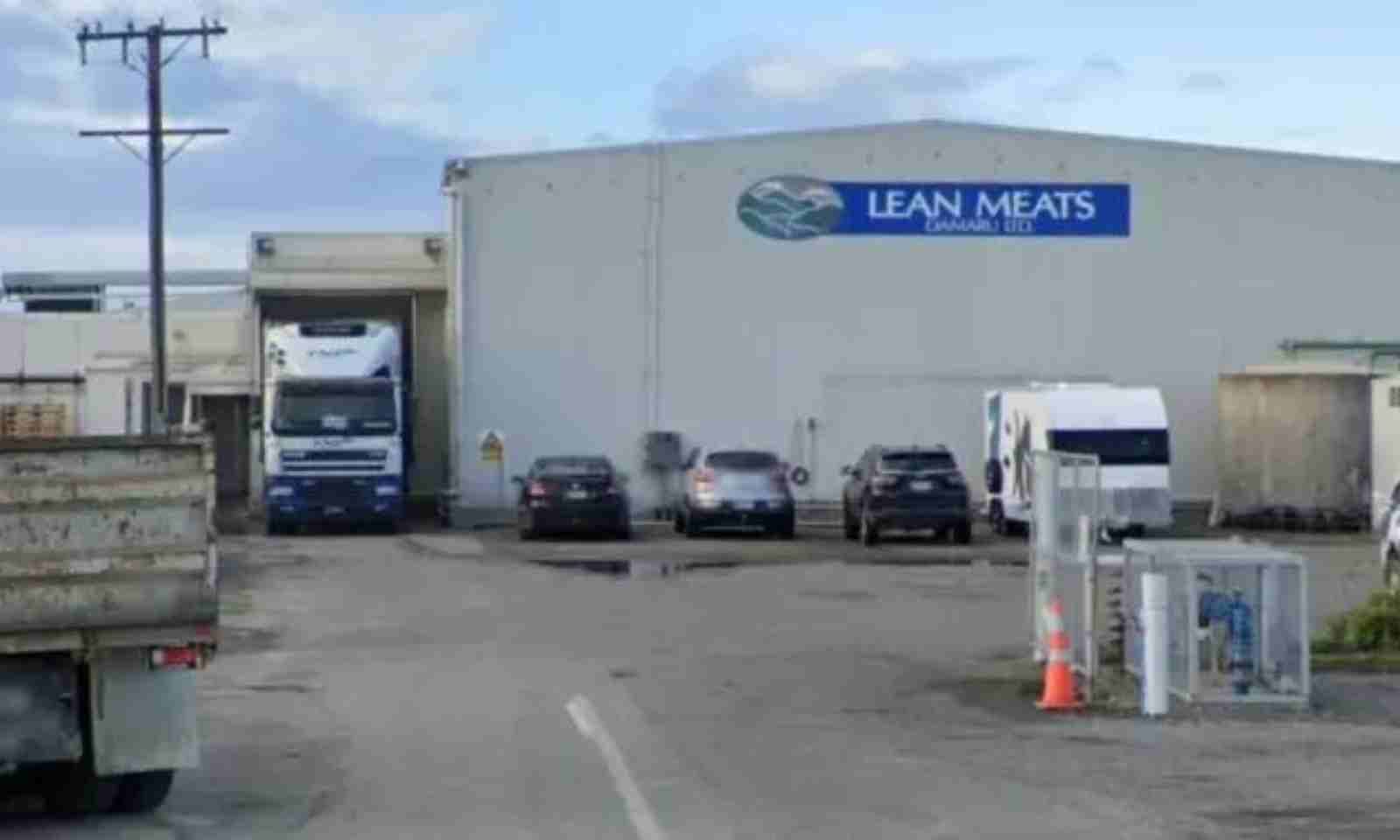

Up to 100 migrant workers have lost their jobs at the Lean Meats Oamaru Ltd's sister company, BX Foods Ltd, in North Otago.
Binxi Foods NZ Ltd
Migrant workers feeling the impact of New Zealand's economic crisis
Hundreds of staff in the meat works sector have been made redundant because their employers just can't keep them on the payroll.


Last-gasp drama and big statements set up Pacific blockbuster in Super Rugby opener

A.R.T sets new Pacific music pace with ‘First Thursday’ releases



Last-gasp drama and big statements set up Pacific blockbuster in Super Rugby opener

A.R.T sets new Pacific music pace with ‘First Thursday’ releases

Content warning: This article contains images of animal carcasses.
Hundreds of jobs in the meat sector have been "discreetly" lost over the last 18 months and this is due to a decline in livestock breeding numbers, industry officials say.
In January last year, the meat industry, including farmers, was calling for more workers to be allowed into New Zealand.
They had warned of losses of at least $600 million in export income in 2023 by not being able to fully process carcasses due to a second consecutive year of labour shortages.
But 18 months on, we are not hearing those similar calls for more workers because the industry is feeling the effects of the economic downturn.
Watch the national secretary of New Zealand's Meat Workers Union Daryl Carran's interview below.
Just last week, up to 100 workers at a plant in the South Island were made redundant, many of them are migrant workers from Fiji.
The group's spokesperson, Joeli Vakala, told PMN News some of the staff still have about two years left on their visas and work contracts.
He fears the displaced workers will be forced to return home, "and it's not fair".
"They have been brought here by the government and the company on a contract to work in New Zealand for up to three years," Vakala said.
"The Immigration and the company must fulfill their obligations in these workers' visas and contracts."
Vakala said the group of workers at Lean Meats Oamaru Limited's sister company BX Foods in North Otago want the New Zealand and Fiji governments to intervene and stop the company from sending the group back home.
More than 180,000 migrant workers are employed across Aotearoa, Daryl Carran, of the Meat Workers Union, said.
The Meat Industry Association (MIA) represents 99 per cent of domestic red meat production and export, making it New Zealand’s second largest exporter with exports of $9.2 billion for the 2020 calendar year.
But in recent years, the industry has been hit by the declining economic climate and some companies have been forced to cut jobs.

Lean Meats Oamaru says the affected workers at its sister company BX Foods are being provided access to BX Foods’ employee assistance programme. Photo/file
New Zealand’s red meat exports dropped by almost 18 per cent in February last year compared to the same period in 2022, according to an analysis by MIA.
Exports to many of New Zealand’s top 10 markets had also decreased, the study found.
Carran said the sheep, beef, veal, and goat processor in Oamaru employed about 300 people, but a proposal could see up to a third of the workers made redundant due to falling throughput reflecting the nationwide trend of declining livestock numbers.
"I don't think it'll be the last downturn we see or the last restructuring that we'll see. I think inevitably we're going to see more," he told Pacific Mornings' William Terite.
"There's been hundreds of jobs discreetly lost over the last 18 months. The industry suffers from overcapacity because the declining breeding numbers have been used, hence the declining lamb crop that's normally processed during the season.
"The industry has been declining year on year for decades," he said.
Carran said while negotiations with the Oamaru Meats were able to save some jobs, they could not keep everyone from being made redundant.
"In the 80s and 90s, we saw substantially big sites with large numbers of workers lose their jobs. So we're seeing a little bit of the revisiting of the past.
"Unfortunately for this side, it's had millions of dollars recently invested in it and refurbished and repurposed. It was redesigned to try and reach throughputs that could never be achieved.

The displaced migrant workers will hope to find employment soon at nearby freezing works such as Alliance in Oamaru. Photo/RNZ
"The design didn't allow for that, never did. And they've had to downsize the original proposals to downsize 100 jobs.
"So there was a mixed effect of that for both locals and migrant workers, of which migrant workers had a three-year visa and have something like 14 to 16 months left on those visas.
"Unfortunately because of that restructuring, there's going to be Pacific Island people affected by it and equally the same amount of locals. We have managed to reduce the original number of contemplated redundancies."
Lean Meats said with the ongoing challenges that have faced the industry over the last 18 months, its sister company BX Foods has made the "difficult decision" to undertake a restructuring to reduce staffing levels.
"This is to ensure the long-term sustainability of its business," Managing Director, Haoran Wang, said in a statement.
“Becoming a leaner and more efficient operation during this difficult period will ensure the preservation of the majority of jobs at the plant, that the business continues to be a key employer in the town of Oamaru and it remains strongly committed to its farmer suppliers.
"Following consultation with employees and constructive engagement with the Meat Workers Union, over 20 fewer jobs will be made redundant than initially proposed. A total of 65 jobs will be lost as part of the restructuring, with around a third of those workers currently proposed to be made redundant being migrants on work visas.
“We understand that this restructuring will affect not only our employees but also their families. We have been heartened by the number of local and regional businesses who have reached out looking to offer roles to impacted employees and we'll do our best to facilitate these employees taking advantage of the opportunities.
"Staff made redundant are being provided access to BX Foods’ employee assistance programme, arranging introductions to employers who have advised of vacancies, and facilitating meetings with WINZ staff who can provide support with understanding entitlements, upskilling, and employment opportunities.
Watch Ligi Harris from Pacific Work Connect talk about the work she does in helping Pacific migrant workers find jobs in NZ.
"Migrant workers made redundant have been provided access to an immigration adviser. They have been advised that if they return home, the cost of their flight will be covered, or, if they transfer to a new employer, costs associated with the transfer of their visa will be covered," Haoran said.
Carran said the challenge now was to find work for those affected.
Could these migrant workers go into other roles or be eligible for assistance from Work and Income?
Carran said an immigration adviser was on site looking into the workers' circumstances.
"The Ministry of Social Development or WINZ can't deal with the migrant workers. That's going to have to be worked through with immigration because they are locked into that plant and can't work anywhere else.
"So it's whether the other employers plus the existing employer are in discussions and try and assist to change the visas to allow them to work elsewhere."
Carran said the reality was that all of a sudden companies would go broke, and you had migrant workers sitting around with no work.
"It's been very poorly managed, the whole thing. And I don't think this lot that's is managing it any better.
"And who is around to assist these workers? They're not entitled to be picking up benefits at this stage. Winz can't interview the displaced workers because they're here on a visa.
"It is a difficult choice because the employer, if the existing employer can't assist with finding them work elsewhere, well, they will have to go home. Their visas will be cancelled or revoked.
"And it's difficult to get good legal advice on this matter because there's not too many people that specialise in this area."
Fiji's government, Immigration New Zealand, and the Ministry of Business, Innovation and Employment (MBIE) have been approached for comment.
